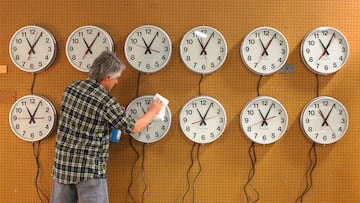Daylight saving time 2024: When does the time change in November in the US?
Clocks will go back one hour in most parts of the United States this weekend. Daylight Saving Time falls on the same Sunday every year - tomorrow, you will be able to to have lie in.

Clocks will go back one hour in all but two US states this weekend - most Americans, apart from those in Hawaii and most of Arizona, will have the option of staying in bed for an extra hour - if they want to, or are able to.
When do clocks go back in the United States in 2024?
This year, clocks will revert back an hour at 2:00 a.m. on Sunday November 3, 2024. This means that you will effectively gain an additional hour of sleep. For example, if you usually wake up at 8 a.m., your new wake-up time will be 9 a.m. However, it is important to note that this change may make you late for any plans you have for that day.
In most cases, you probably won’t need to wait up to physically set your clock back to 1 a.m. when the hand reaches 2 a.m. On smart devices such as mobile phones (Android or iOS), tablets, desktop PCs running either Windows or macOS... etc. the digital clock will automatically set itself back an hour. So you can stay in bed and enjoy that extra hour.
Want some more sleep? Grab an extra hour Sunday as daylight saving time ends https://t.co/uKpzIR0ydj
— Florida Times-Union (@jaxdotcom) October 30, 2024
Spring forward, Fall back
The shift is always done on the weekend, the first Sunday after Halloween, to limit the amount of disruption caused as the majority of people won’t be getting up for work the next day.
Legislation has been passed in the Senate to permanently end the practice through the Sunshine Protection Act, which would effectively end Daylight Saving Time (DST). However, it was not passed in the House of Representatives during the legislative period necessary to become law.
Last fall, a bipartisan group of Senators, who rarely agree on policy, came forward asking for another vote on the bill to take place so that DST can be eliminated once and for all. But for now, they have never been signed into law.
In 2022, the Senate passed my Sunshine Protection Act. This legislation would have let Americans stop the outdated practice of changing the clocks.
— Senator Marco Rubio (@SenMarcoRubio) November 2, 2024
Two years later, this issue is still pressing for Americans. https://t.co/ZwmOiwniZd
Residents in some states will not be changing their clocks
There have been calls across the US to end the practice of changing the hours twice a year, with clocks going forward an hour on the second Sunday in March and back an hour on the first Sunday in November. Nineteen states have introduced legislation to do away with the twice-yearly switch, but the authority to do so has been reserved by the Department of Transportation since 1966.
The only parts of the US that do not have DST are some areas of Arizona, Hawaii, Puerto Rico, the US Virgin Islands, Northern Mariana Islands, Guam, and American Samoa.
Arizona experimented with the change beginning in 1918 but decided to opt out of the Daylight Savings Time permanently in 1968 with the argument that instead of saving energy, consumption increased. The state does observe Standard Time however, the Navajo Nation, a Native American territory in the northeast of the state, which also crosses over into New Mexico and Utah, does make the twice-a-year time shift.
Thanks to their position near the equator, Hawaii, along with the other US territories in the Pacific and Puerto Rico. Since they are close enough to the equator that there is no significant difference in sunrise and sunset times across the year, there are no benefits from changing the hour.
The United States began daylight saving time in 1918, copying efforts by Germany and Britain to save energy during WWI. pic.twitter.com/wTj1n8pgmA
— USA TODAY (@USATODAY) October 31, 2024
Does the European Union practice Daylight Saving Time?
Yes. The European Union member states change their clocks one week before the United States, meaning that for a short period, the time difference between the two areas is one hour less than it is typically.
Related stories
Typically, clocks fall back an hour at 2 a.m. on the last Sunday in October. So for example this year, European clocks went back on Sunday 27 October.
In Europe, DST starts at the same time as in the US, on the last Sunday in March. The practice was first introduced in Europe in 1916 by Germany in a bid to reduce coal consumption. The United States followed suit in March 1918. In Europe, the practice was phased out after the First World War but reintroduced in the mid-70s as a consequence of the oil crisis.


Complete your personal details to comment